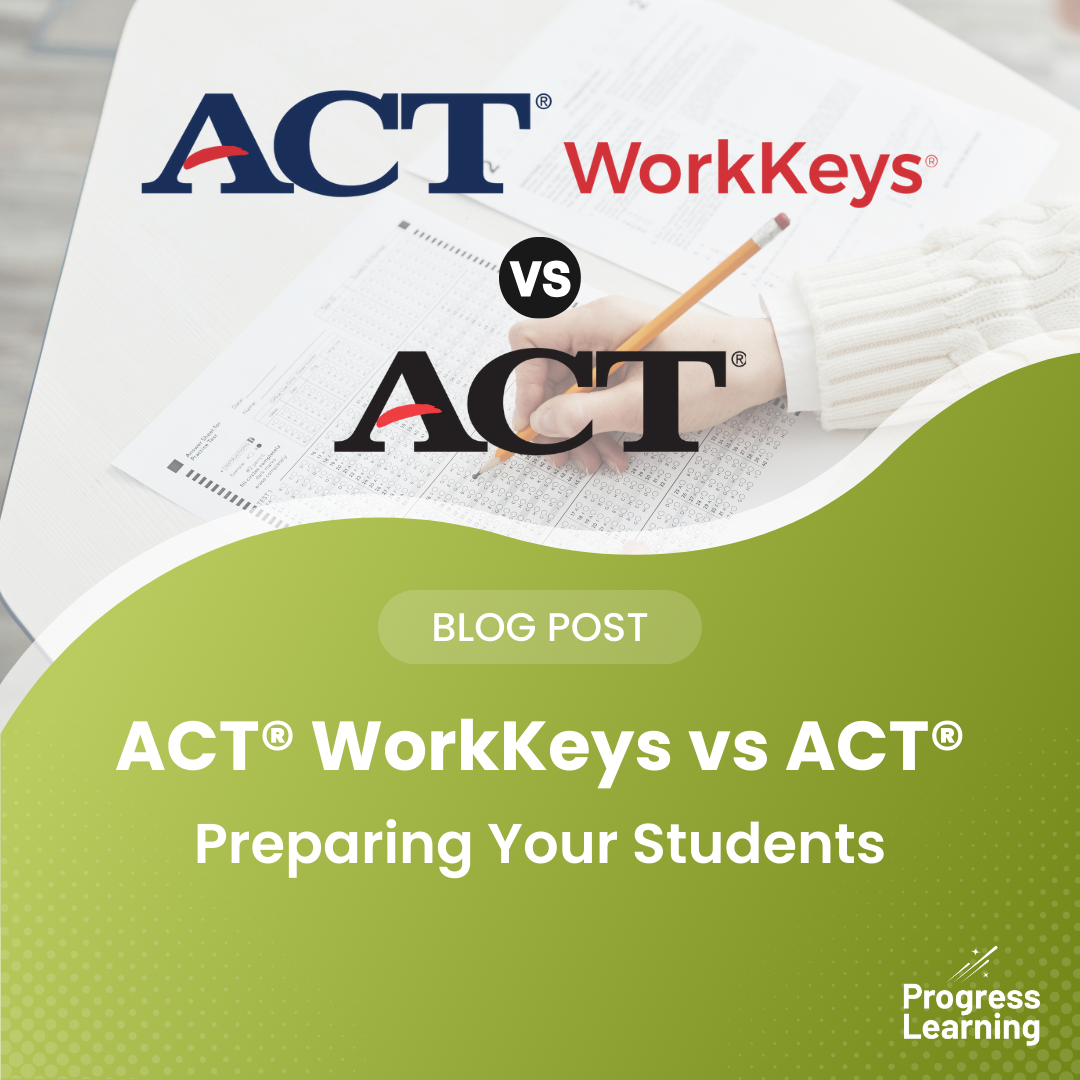SAT® and ACT® High School Graduation Requirements by State
When it comes to high school graduation, not all states play by the same rules. Some require the SAT® or ACT® for accountability purposes, others tie them to graduation or funding, and a few let students substitute these scores for other requirements. If you’re navigating college and career readiness (CCR) policies or supporting students on their path to graduation, understanding each state’s expectations is essential.
To make it simple, we’ve broken things down into two clear tables: one for states with SAT® requirements and another for ACT®. Each includes the purpose of the test, score requirements (if any), and how it may affect school accountability or funding.
States Requiring the SAT®
| State | Requirement Description | Score Requirement | Funding/Accountability Impact |
| Colorado | SAT® required for all 11th graders for accountability. | Yes, 470 EBRW, 480 Math (Class of 25-26) | Part of school accountability. |
| Connecticut | SAT® replaces state test for 11th grade. Used as summative assessment. | No | Included in accountability model. |
| Delaware | Statewide SAT® for 11th graders. | No | Contributes to state accountability. |
| Indiana | Students must complete a graduation pathway, the SAT® is one pathway. | Yes, 480 EBRW, 530 Math | CCR graduation pathway indicator. |
| Ohio | A graduation pathway is required, which the SAT® can satisfy | Yes, 480 EBRW, 530 Math | Indirect effect by contributing to seal attainment |
| Michigan | SAT® with essay required as part of MME. | No | Required for graduation accountability. |
| New Hampshire | SAT® is the statewide assessment for 11th grade. | No | Accountability indicator. |
| New Mexico | SAT® required in grade 11 for all public school students. | No | Accountability indicator. |
| Tennessee | ACT® or SAT® required for graduation | No specific score is required. | ACT® and SAT® are part of CCR funding formula. |
| Pennsylvania | Not required but can be used as an alternate assessment pathway | Yes, over 1010 composite | No direct effect |
| Rhode Island | SAT® is the state assessment for ELA and math in high school. | No | Accountability only. |
| West Virginia | SAT® replaces state test in grade 11. | No | Accountability and CCR. |
States Requiring the ACT®
| State | Requirement Description | Score Requirement | Funding/Accountability Impact |
| Alabama | ACT® required for graduation; CCR benchmarks needed for diploma or alternative pathway. | Yes – meet benchmark of 1 section or alternative. | CCR indicator for diploma qualification. |
| Arizona | ACT® + Writing required for 11th graders. | No | State accountability measure. |
| Arkansas | ACT® required as part of CCR assessment. | No | State accountability measure. |
| Hawaii | ACT® + Writing required as 11th-grade statewide assessment. | No | Participation fulfills graduation requirement. |
| Illinois | ACT® + Writing required for 11th graders. | No | State accountability measure. |
| Kansas | ACT® required for all 11th graders; optional participation. | No | Accountability measure. |
| Kentucky | Required ACT® in 11th grade for accountability. | No | CCR accountability measure. |
| Louisiana | ACT®, career path, or military exam required. (Prior to 25-26 school year, ACT® was required for all students.) | No | Accountability measure. |
| Mississippi | All juniors take ACT®. | Not required, but certain scores qualify students for endorsements | CCR indicator. |
| Montana | ACT® required in 11th grade. | No | CCR and accountability. |
| Nebraska | ACT® replaces state test for 11th grade. | No | Used in accountability. |
| Nevada | ACT® required for 11th grade; part of the state CCR indicator. | No | CCR and school performance indicators. |
| North Carolina | ACT® required in grade 11. | No | CCR and accountability measure. |
| Ohio | A graduation pathway is required, which the ACT® can satisfy | Yes, English subscore of 22, Mathematics subscore of 22 | Indirect effect by contributing to seal attainment |
| Oklahoma | Districts choose SAT® or ACT® for 11th grade accountability. | No | Accountability measure. |
| Pennsylvania | Not required but can be used as an alternate assessment pathway | Yes, over 21 composite | No direct effect |
| South Carolina | ACT® (or SAT®) is part of CCR indicator; students can also take WorkKeys. Neither is required. | No | Impacts school rating and funding opportunities. |
| South Dakota | ACT® required beginning in 2025–26 school year. | TBD | TBD |
| Tennessee | ACT® or SAT® required for graduation | State wide goal of achieving an average composite score of 21. | ACT® and SAT® are part of CCR funding formula. |
| Wisconsin | ACT® + Writing required for 11th grade. | No | Accountability measure. |
| Wyoming | ACT® is the required statewide test for juniors. | No | Accountability measure. |
Why This Matters: Graduation & Funding Tied to Performance
While many states require ACT® or SAT® participation simply for data and accountability, a growing number are tying student performance on these tests directly to high-stakes outcomes—either as graduation criteria or as part of school and district funding formulas.
- In Colorado, although students have multiple pathways to demonstrate graduation competency, achieving specific SAT® cut scores (such as 470 EBRW and 480 Math) remains the most commonly used and accessible route. These score thresholds have even been temporarily adjusted to reflect changes in academic performance trends, highlighting how policy can respond to broader educational shifts.
- South Carolina offers a CCR pathway that includes ACT®, SAT®, and WorkKeys® scores as indicators of college and career readiness. This not only affects student transcripts and postsecondary opportunities but also factors into the state’s school rating system, which influences funding and resources allocated to districts.
- Even in states where no minimum score is required, ACT® and SAT® results often feed into state accountability frameworks, which affect school report cards, state intervention status, and eligibility for additional funding or support.
The stakes are real: if students don’t reach the required benchmarks, or if schools fail to demonstrate overall readiness metrics, there can be real consequences, including missed diploma requirements, lower school ratings, and reduced access to state or federal support. Educators, administrators, and policymakers need clear tools to track readiness, prepare students, and address gaps early.
How Progress Learning Can Help
If your state ties graduation, accountability, or funding to ACT®/SAT® performance, preparation is not optional, it’s a necessity. That’s where Progress Learning comes in.
We provide:
- ACT® and SAT®-aligned practice to help students build confidence and familiarity with test content.
- WorkKeys® prep to support CCR pathways in states like Alabama and South Carolina.
- Formative assessments and targeted remediation, ensuring students can close gaps and reach score goals.
- Progress monitoring and real-time reporting, so educators can track readiness and intervene early.
Progress Learning is designed for schools and districts. Whether you’re preparing students for graduation or maximizing CCR funding opportunities, we’re here to help every step of the way.
Get in touch below to see our SAT®, ACT®, and full College and Career Readiness solution.


